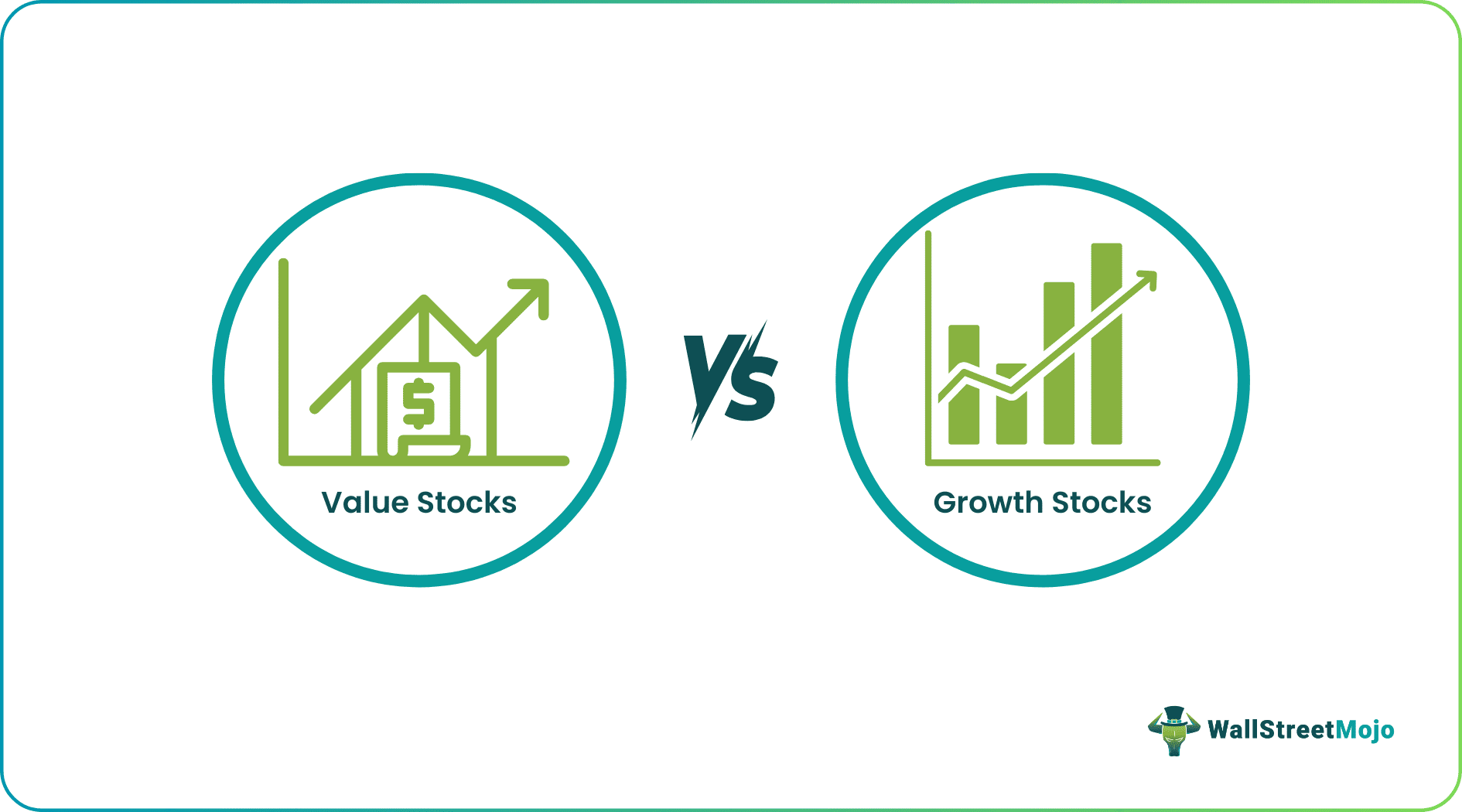Table Of Contents
Difference Between Value and Growth Stocks
Value Stocks are stocks in which the current stock prices are different from the stock's perceived value. With the expectation that value is realized, the stocks are invested, whereas, Growth Stocks are stocks where the increase in stock price is expected because of capital appreciation or the growth in net income.
The stocks can be divided into two types.

- On the other hand, value stocks are stocks of large organizations that have been traded below their worthy value. In simple words, value stocks are undervalued stocks for a reason. The under-valuation can be any scandal, flawed perception of the public, or any setback at the company.
- Growth stocks are stocks that can outperform any other stocks of competitors. These growth stocks can be of small, medium, or large-sized organizations. The emphasis on growth stocks is "potential." The financial analysts give the prediction of these stocks. Due to the great operations or efficient management, these stocks are growing super-fast, faster than any competitors.
The similarity between them is that both can be beneficial for investors. For example, if investors invest in growth stocks, they can expect their money to grow faster. And if they invest in value stocks, they will get a lower price per share while buying, and when the value of the stocks increases (which will happen eventually as per the predictions of financial analysts), they will be able to sell the stocks.
But as you can guess, there're many differences between these two types of stocks.
Do you know why people choose to invest in stock over any other instrument? It's because stocks grow faster than the inflation rate. To mitigate the risk, the investors may choose mutual funds, ETFs, but these are culminations of stocks too.
Value vs. Growth Stocks Infographics
Let's see the top differences between value stock vs. growth stock along with infographics.

Key Differences
- Valued stocks have great potential and are currently undervalued due to a scandal, a bad name, or public perception. On the other hand, growth stocks have great potential for outperforming similar stocks in a similar industry.
- If you invest in valued stocks, the risk & volatility are lower (they can be higher in a few cases). On the other hand, growth stocks have more risk & volatility (which can be lower in some instances).
- As per John Dowdle, it was found that valued stocks did exceptionally well than growth stocks from 2011 to 2013. The valued stocks in the study were more risky and volatile than the growth stocks.
- Valued stocks are undervalued stocks. That's why investors prefer valued stocks more. Growth stocks, on the other hand, are overvalued stocks.
Video Explanation of Value vs Growth Stocks
Value vs. Growth Stock Comparative Table
| Basis for Comparison | Value Stocks | Growth Stocks |
|---|---|---|
| 1. Which stocks investors prefer more? | These stocks are undervalued than they should have been. That’s why investors prefer to invest in these stocks. They are preferred more than growth stocks. It's because valued stocks can be bought at an undervalued price. | As per the prediction of financial analysts, these stocks will outperform every other stock in the similar industry. They are not often preferred because investors can't see it now (it may/may not outperform other stocks shortly). Plus, growth stocks can sometimes be overvalued and expensive. |
| 2. Overvalued/Undervalued | Valued stocks are undervalued stocks. | Growth stocks are overvalued stocks. |
| 3. Risk & Volatility | Valued stocks have lower risk & volatility because even if the price doesn't go higher, you wouldn't lose anything. | Growth stocks have more risk & volatility. No-one knows how growth stocks will be priced. All predictions of financial analysts don't come true. |
| 4. Companies associated | Valued stocks are associated usually with large organizations (Large Caps) | Growth stocks can be associated with small (small caps), mid-caps Stock, and also large-sized organizations. |
| 5. Outperformance (as per the research of John Dowdee) | From the research, it was found that valued stocks outperformed all growth stocks even if the former were more volatile than the latter. | As per the research, growth stocks did poorly even if the risk & volatility were lesser than that of valued stocks. |
Final Thoughts
Even if valued stocks are undervalued due to a scandal or bad reputation, it has more value in the investors' eyes than the growth stocks. If we can keep two stocks in front of an experienced investor, she will pick the valued one first.
Of course, there are other factors that one needs to consider, e.g., volatility, risk, market reputation, prediction of financial analysts, historical performance, etc. But clearly, investing in valued stocks is more beneficial to investors than growth stocks.

